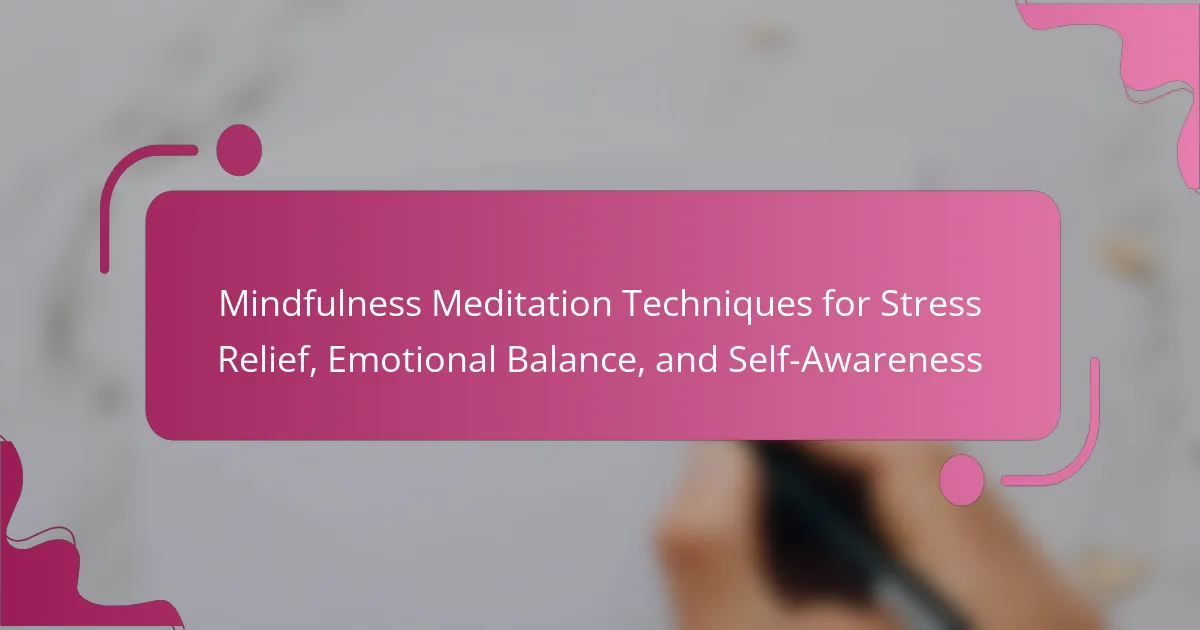Mindfulness meditation is a powerful tool for stress relief, emotional balance, and self-awareness. It promotes relaxation and reduces cortisol levels, enhancing mental health. Techniques like focused breathing and body scans cultivate present-moment awareness, helping individuals manage their emotions effectively. Unique methods, such as sound bathing and nature immersion, are gaining traction, offering fresh approaches to deepen mindfulness practice.
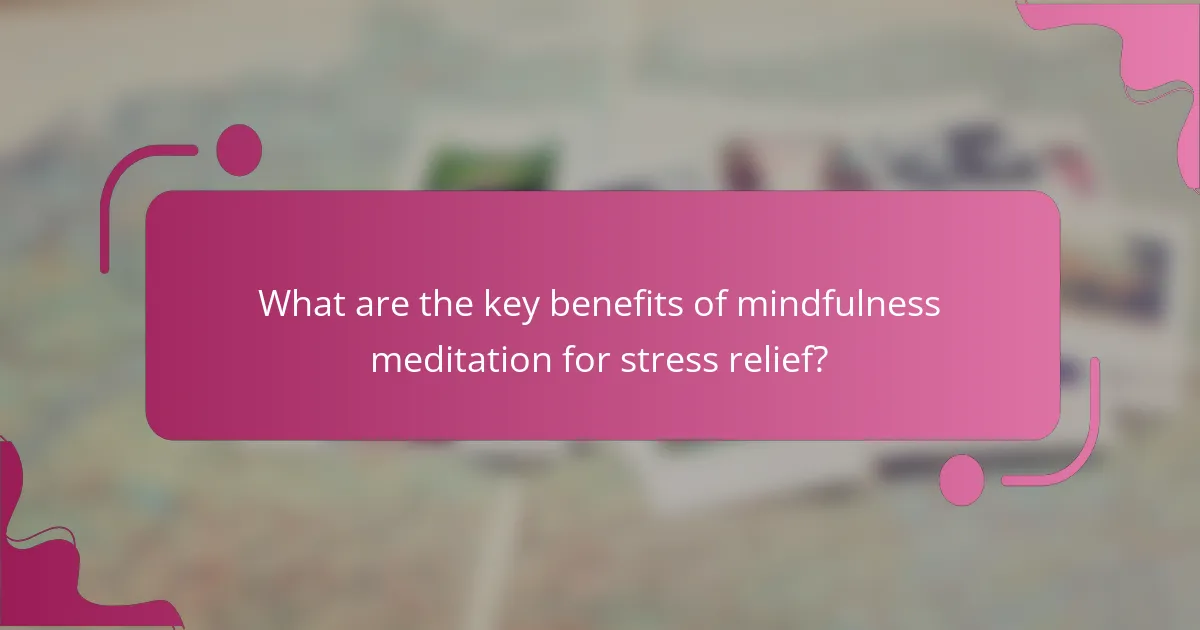
What are the key benefits of mindfulness meditation for stress relief?
Mindfulness meditation offers significant benefits for stress relief by promoting relaxation, enhancing emotional balance, and increasing self-awareness. It reduces cortisol levels, which are linked to stress, and improves overall mental health. Regular practice can lead to better focus and a greater sense of control over one’s emotions. Research indicates that just 10 minutes of mindfulness meditation daily can significantly lower stress levels and improve resilience.
How does mindfulness meditation reduce stress levels?
Mindfulness meditation effectively reduces stress levels by promoting relaxation and enhancing emotional regulation. This practice encourages individuals to focus on the present moment, which can diminish anxiety and stress responses. Studies indicate that regular mindfulness meditation can lower cortisol levels, a hormone associated with stress. Additionally, it fosters greater self-awareness, allowing individuals to identify stress triggers more effectively. This increased awareness can lead to healthier coping mechanisms, contributing to emotional balance and overall well-being.
Which mindfulness techniques are most effective for managing stress?
Mindfulness techniques such as deep breathing, body scan, and loving-kindness meditation are effective for managing stress. These methods enhance emotional balance and self-awareness by promoting relaxation and reducing anxiety.
Deep breathing focuses on inhaling and exhaling slowly to calm the mind. Body scan involves mentally checking in with different body parts to release tension. Loving-kindness meditation fosters compassion towards oneself and others, improving emotional well-being.
Research shows that practicing these techniques regularly can lower cortisol levels, the hormone associated with stress. Engaging in mindfulness practices for just a few minutes each day can lead to significant improvements in stress management and overall mental health.
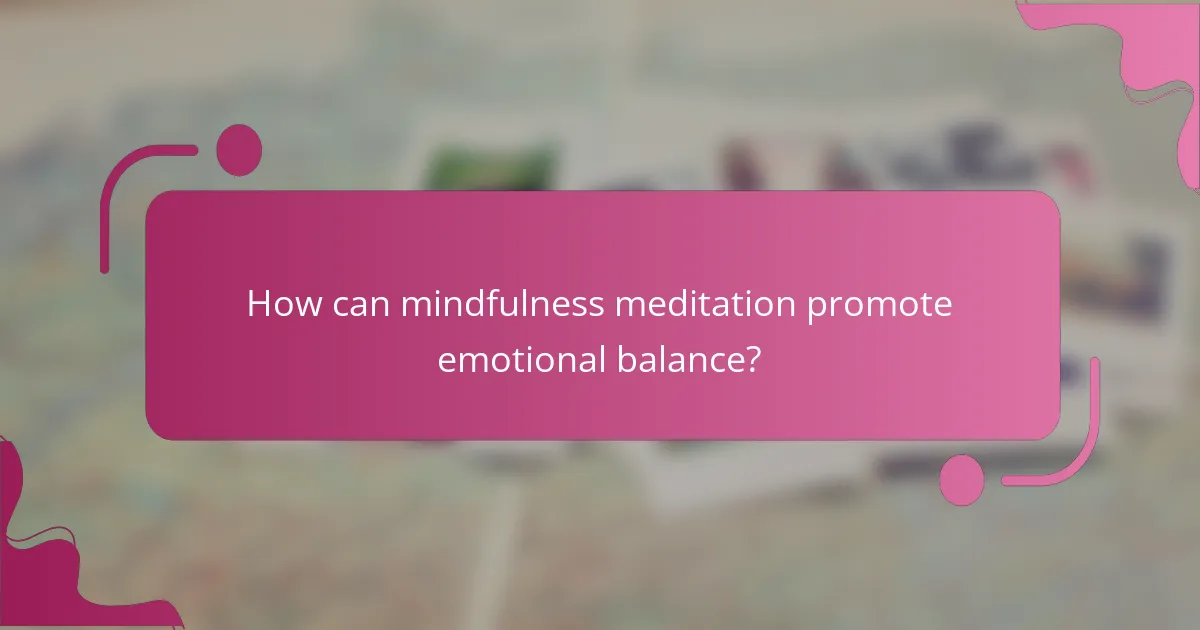
How can mindfulness meditation promote emotional balance?
Mindfulness meditation promotes emotional balance by enhancing self-awareness and reducing stress. Regular practice helps individuals recognize and regulate their emotions, leading to improved mental well-being. Techniques such as focused breathing and body scans cultivate present-moment awareness, which can diminish anxiety and promote resilience. Studies show that mindfulness can decrease symptoms of depression and increase emotional regulation, making it a valuable tool for emotional balance.
What role does mindfulness play in emotional regulation?
Mindfulness plays a crucial role in emotional regulation by enhancing self-awareness and promoting emotional balance. It allows individuals to observe their thoughts and feelings without judgment, leading to better management of stress. Mindfulness practices, such as focused breathing and body scans, help reduce anxiety and increase resilience. Research indicates that regular mindfulness meditation can significantly lower emotional reactivity, fostering a calmer and more centered state of mind. This improvement in emotional regulation contributes to overall mental well-being and healthier interpersonal relationships.
Which specific mindfulness practices enhance emotional stability?
Mindfulness practices that enhance emotional stability include meditation, body scans, and mindful breathing. These techniques promote awareness and regulation of emotions, leading to improved stress management and emotional balance.
Meditation fosters a calm mind, allowing individuals to observe thoughts without judgment. Body scans enhance body awareness, helping to release tension and recognize emotional triggers. Mindful breathing provides immediate stress relief by grounding individuals in the present moment.
Research indicates that regular practice of these techniques can lead to significant improvements in emotional resilience and well-being. For instance, a study found that participants practicing mindfulness reported a 30% reduction in anxiety levels after eight weeks.
Incorporating these practices into daily routines can create lasting benefits for emotional health and stability.
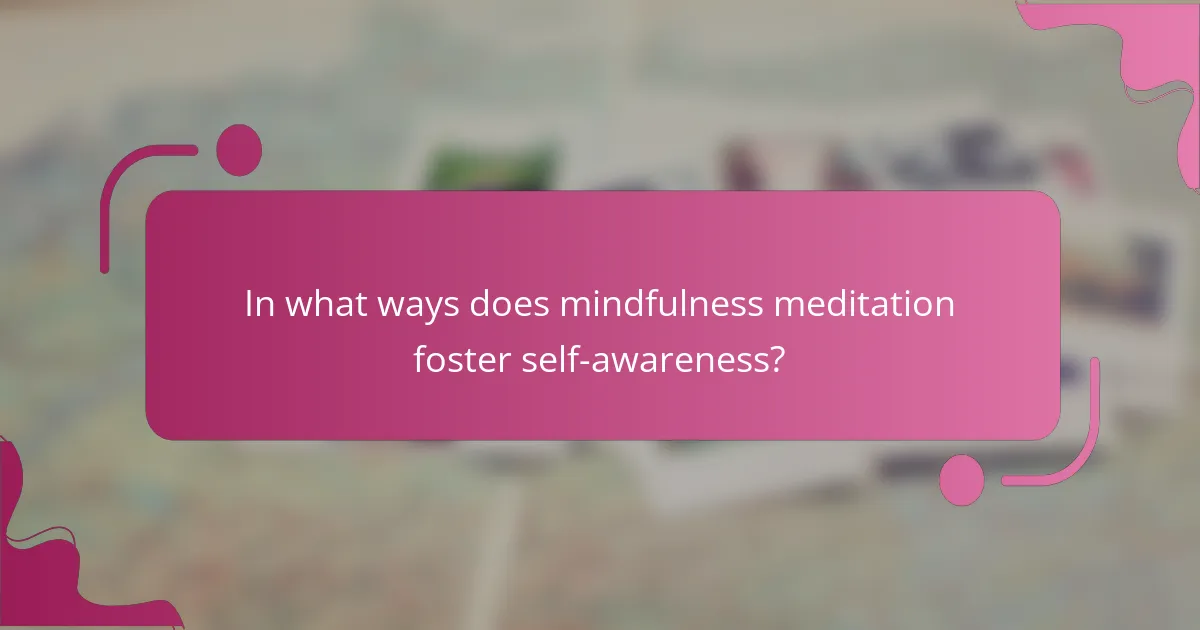
In what ways does mindfulness meditation foster self-awareness?
Mindfulness meditation enhances self-awareness by promoting present-moment focus and introspection. Practitioners develop a deeper understanding of their thoughts, emotions, and bodily sensations, leading to improved emotional regulation. This technique encourages non-judgmental observation, allowing individuals to recognize patterns in their behavior and reactions. As a result, they can respond to stressors more mindfully, fostering emotional balance and resilience.
How does increased self-awareness impact mental health?
Increased self-awareness significantly enhances mental health by fostering emotional regulation and reducing anxiety. Mindfulness meditation techniques cultivate this awareness, allowing individuals to recognize their thoughts and feelings without judgment. As a result, practitioners often experience improved emotional balance and lower stress levels. Studies show that regular mindfulness practice can lead to a 30% reduction in anxiety symptoms, highlighting its effectiveness in promoting mental well-being.
Which mindfulness exercises are best for cultivating self-awareness?
Mindfulness exercises that effectively cultivate self-awareness include body scanning, mindful breathing, and journaling. These techniques enhance emotional balance and reduce stress while promoting a deeper understanding of one’s thoughts and feelings.
Body scanning involves mentally scanning the body for tension and sensations, fostering awareness of physical presence. Mindful breathing focuses on the breath, anchoring attention to the present moment. Journaling encourages reflection on daily experiences, emotions, and thoughts, providing insights into personal patterns and behaviors.
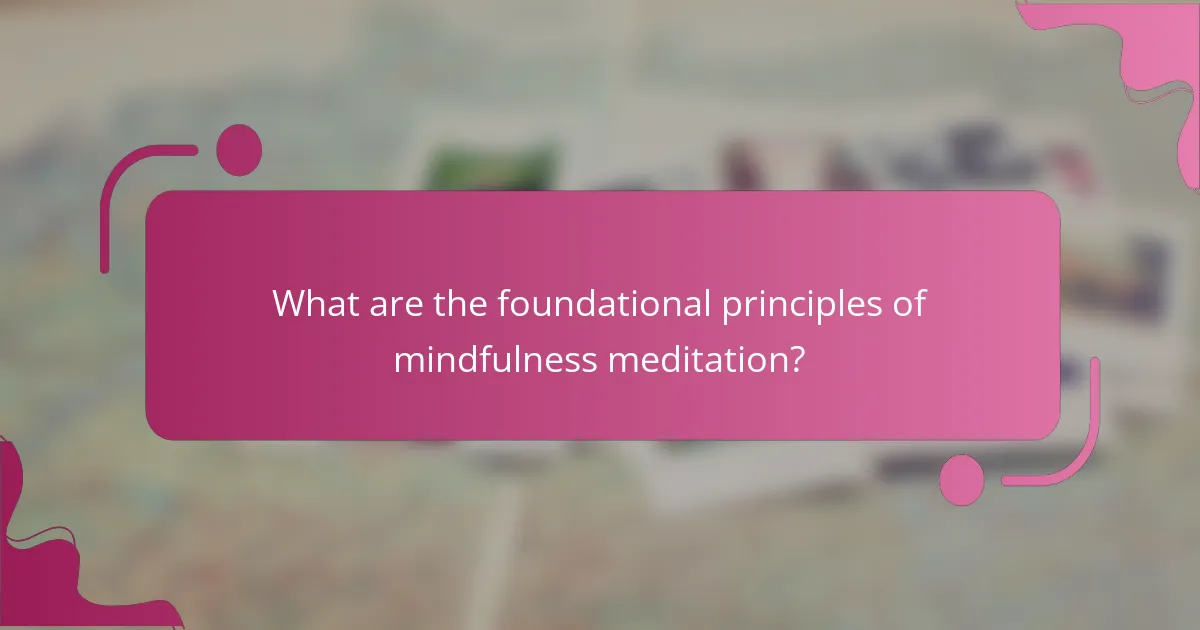
What are the foundational principles of mindfulness meditation?
Mindfulness meditation is grounded in principles that enhance stress relief, emotional balance, and self-awareness. These foundational principles include present-moment awareness, non-judgmental observation, and acceptance of thoughts and feelings.
Present-moment awareness focuses on engaging fully with the current experience, reducing anxiety about past or future events. Non-judgmental observation encourages individuals to notice their thoughts and emotions without labeling them as good or bad. Acceptance fosters a compassionate approach to one’s internal experiences, promoting emotional balance.
These principles create a framework that supports individuals in cultivating a deeper sense of self-awareness and resilience against stress. Practicing mindfulness meditation regularly can lead to significant improvements in mental well-being and emotional regulation.
How do core mindfulness techniques differ across cultures?
Core mindfulness techniques vary across cultures primarily in their practices and underlying philosophies. For instance, in Buddhist traditions, mindfulness emphasizes awareness of thoughts and sensations, while Western approaches often focus on cognitive behavioral techniques.
In Japan, Zen mindfulness incorporates meditation with daily activities, promoting presence in the moment. Conversely, in the United States, mindfulness is frequently adapted into therapeutic settings, emphasizing stress relief and emotional regulation.
Additionally, some Indigenous cultures integrate mindfulness with spiritual practices, highlighting a connection to nature and community. These variations reflect unique cultural values, yet all aim to enhance self-awareness and emotional balance.
Which common misconceptions exist about mindfulness meditation?
Many misconceptions about mindfulness meditation hinder its practice and benefits. One common belief is that mindfulness requires complete silence and stillness, which is not true; it can be practiced in various environments. Another misconception is that mindfulness meditation is solely about emptying the mind, while the focus is actually on observing thoughts without judgment. Some people think it is a quick fix for stress, but consistent practice is necessary for lasting emotional balance and self-awareness. Lastly, many believe mindfulness meditation is only for certain individuals, but it is accessible and beneficial for everyone, regardless of background or experience.
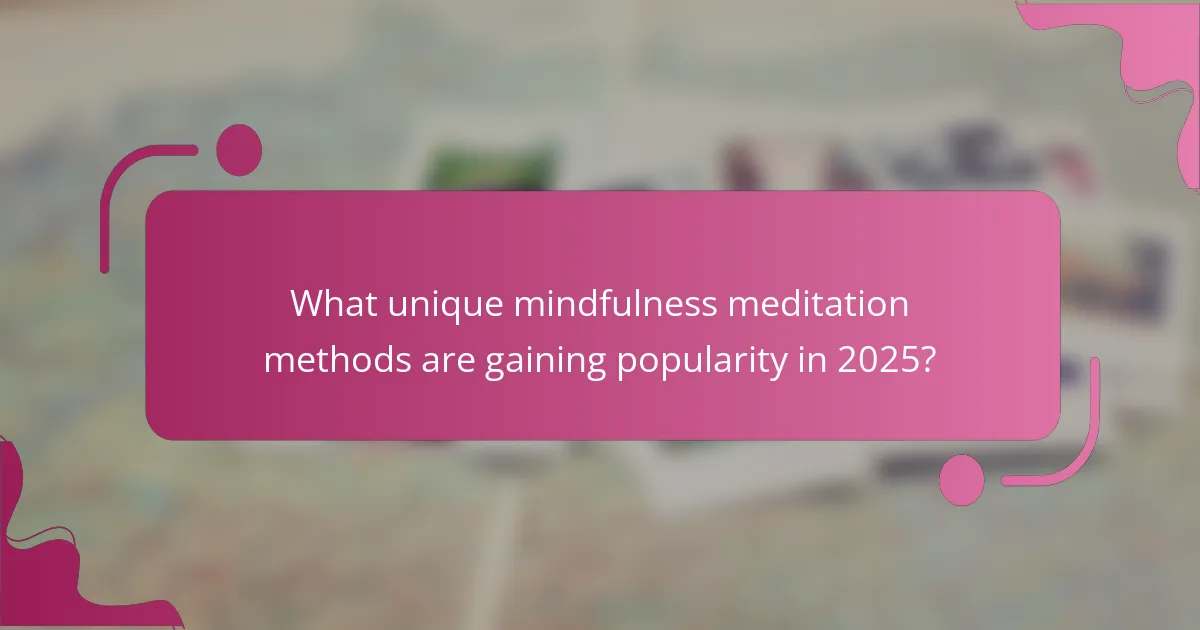
What unique mindfulness meditation methods are gaining popularity in 2025?
Unique mindfulness meditation methods gaining popularity in 2025 include sound bathing, nature immersion, and digital detox meditation. These techniques enhance stress relief, emotional balance, and self-awareness.
Sound bathing utilizes sound frequencies to promote relaxation and mindfulness. Nature immersion involves meditative practices in natural settings, fostering a deeper connection with the environment. Digital detox meditation encourages time away from screens, allowing for introspection and mental clarity.
Each method offers distinct benefits, appealing to individuals seeking innovative ways to enhance their mindfulness practice.
How are modern interpretations of mindfulness evolving?
Modern interpretations of mindfulness are increasingly integrating technology and neuroscience, enhancing traditional practices. Techniques now often include guided meditations through apps, virtual reality experiences, and neurofeedback tools. These innovations aim to deepen stress relief, emotional balance, and self-awareness by making mindfulness more accessible and personalized. As a result, practitioners can tailor their experiences to individual needs, reflecting a unique evolution in the mindfulness landscape.
What innovative tools are available for practicing mindfulness meditation?
Innovative tools for practicing mindfulness meditation include apps, wearable devices, and guided audio sessions. These resources enhance stress relief, emotional balance, and self-awareness.
Apps like Headspace and Calm provide structured programs and reminders. Wearable devices, such as smartwatches, offer biofeedback to track stress levels. Guided audio sessions on platforms like Insight Timer feature expert-led practices.
Virtual reality experiences immerse users in calming environments, promoting mindfulness. Online communities also support shared experiences and accountability. These tools cater to various preferences, making mindfulness meditation more accessible and engaging.
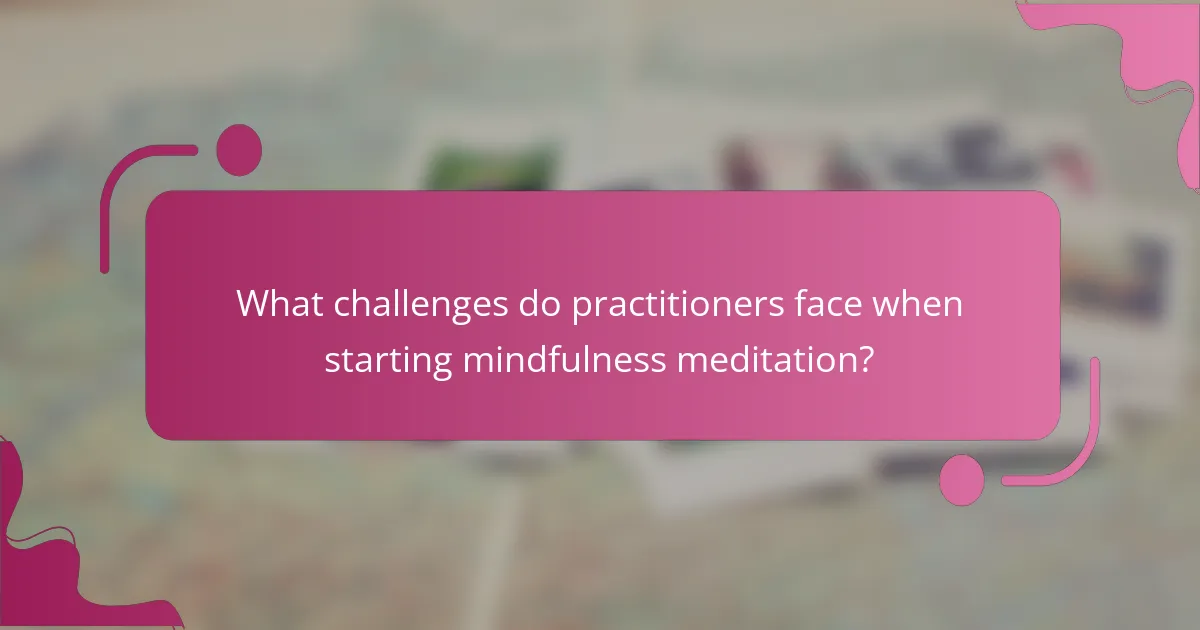
What challenges do practitioners face when starting mindfulness meditation?
Practitioners face several challenges when starting mindfulness meditation, including difficulty maintaining focus, managing expectations, and dealing with emotional discomfort. These obstacles can hinder the development of stress relief, emotional balance, and self-awareness.
Many beginners struggle with distractions, making it hard to stay present during sessions. Additionally, unrealistic expectations about immediate benefits can lead to frustration. Emotional discomfort may arise as practitioners confront feelings they have avoided, complicating their practice.
Establishing a consistent routine is another hurdle, as busy schedules can interfere with regular meditation. Finally, finding the right technique that resonates personally can be challenging, as various methods exist.
How can beginners overcome common obstacles in mindfulness practice?
Beginners can overcome common obstacles in mindfulness practice by establishing a routine, setting realistic expectations, and using guided meditations. Consistency aids in building a habit, while manageable goals prevent frustration. Guided sessions provide structure and support, making it easier to stay focused.
What strategies help maintain consistency in mindfulness meditation?
Consistent mindfulness meditation can be maintained through structured routines, focused breathing, and setting clear intentions. Establishing a regular schedule enhances habit formation. Using guided meditations can provide direction and support. Engaging in mindfulness during daily activities reinforces practice. Tracking progress with a journal can foster motivation and self-awareness.
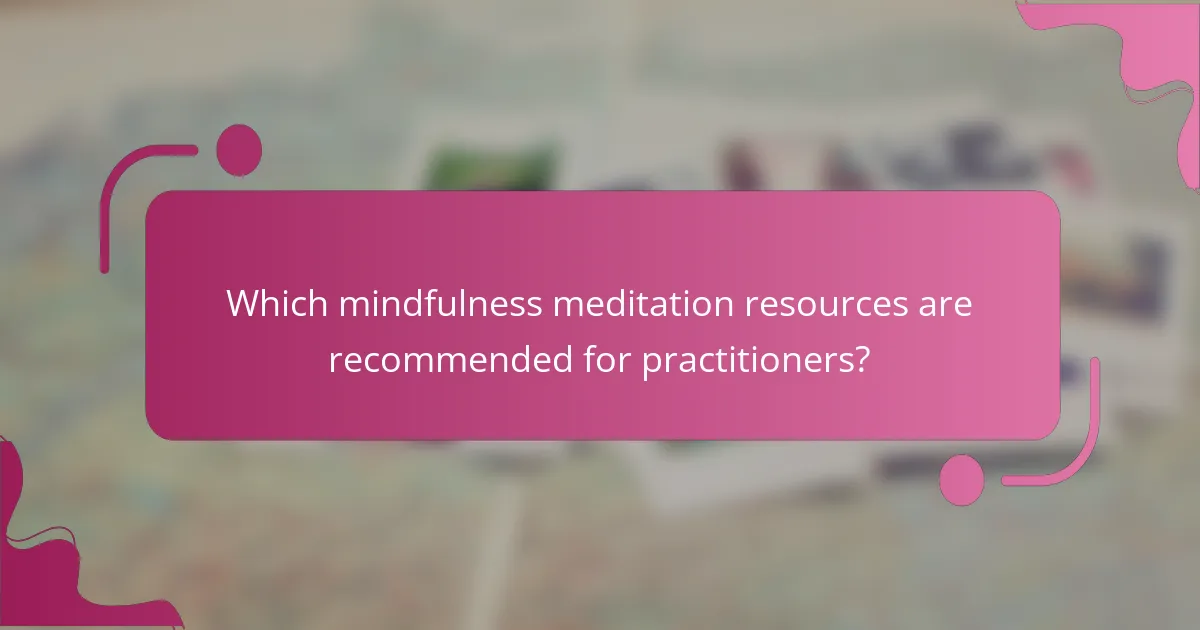
Which mindfulness meditation resources are recommended for practitioners?
Recommended resources for mindfulness meditation include apps, books, and online courses. Popular apps like Headspace and Calm offer guided sessions for stress relief and emotional balance. Books such as “The Miracle of Mindfulness” by Thich Nhat Hanh provide insights into mindfulness practices. Online platforms like Coursera and Udemy feature courses led by experienced instructors, enhancing self-awareness through structured learning. These resources cater to various levels, making mindfulness accessible to all practitioners.
What role do apps and online platforms play in mindfulness practice?
Apps and online platforms enhance mindfulness practice by providing accessible resources and structured guidance. They offer a variety of meditation techniques tailored for stress relief, emotional balance, and self-awareness. Many platforms feature customizable programs, allowing users to track progress and set personal goals. Additionally, community features foster connection and support among practitioners. These tools make mindfulness more approachable and adaptable to individual lifestyles, promoting consistent practice and deeper engagement.
Which books and courses offer valuable insights into mindfulness meditation?
Books and courses that provide valuable insights into mindfulness meditation include “The Miracle of Mindfulness” by Thich Nhat Hanh and the “Mindfulness-Based Stress Reduction” course developed by Jon Kabat-Zinn. These resources focus on techniques for stress relief, emotional balance, and self-awareness.
Other noteworthy mentions are “Radical Acceptance” by Tara Brach, which emphasizes self-compassion, and online platforms like Coursera offering guided mindfulness courses. Each of these resources deepens understanding and practice of mindfulness meditation.
What are the best practices for integrating mindfulness into daily life?
To integrate mindfulness into daily life, practice techniques that enhance stress relief, emotional balance, and self-awareness. Start with short daily sessions, gradually increasing duration. Incorporate mindful breathing exercises during routine activities, such as eating or walking. Set reminders to pause and reflect throughout the day. Engage in guided meditations to deepen practice and explore different techniques. Join a mindfulness group or workshop for community support and accountability.
